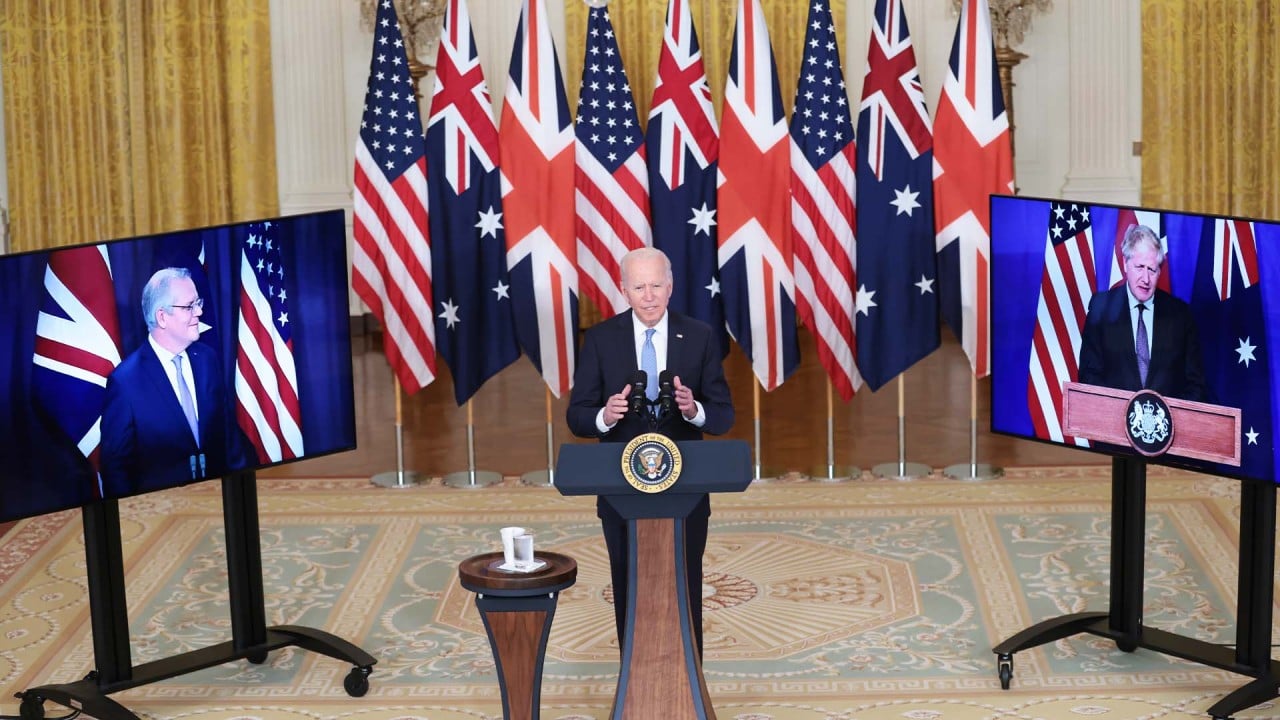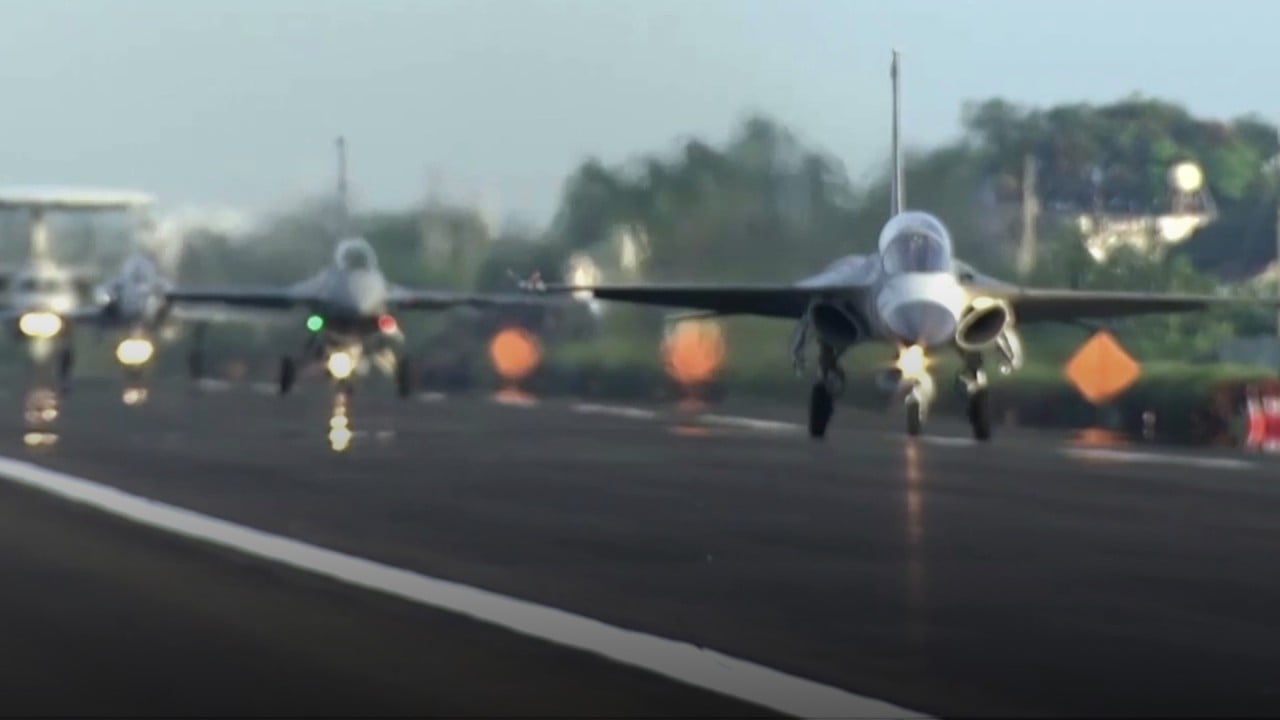Advertisement
Advertisement

Opinion
Danil Bochkov
Danil Bochkov
With Aukus alliance, US turns away from Europe and drives China closer to Russia and Iran
- Washington has prioritised the Anglosphere and ignored the efforts of its European allies, creating rifts in its alliance network
- China and Russia have responded by intensifying their collaboration and bringing Iran into the Shanghai Cooperation Organisation
On September 21, US President Joe Biden gave his first address to the United Nations stressing that Washington is “not seeking a new Cold War or a world divided into rigid blocs”. But no sooner had Biden stepped down from the UN General Assembly podium than he welcomed leaders of the Quadrilateral Security Dialogue to the White House.
In their first in-person meeting, all four leaders pledged to facilitate a free and open Indo-Pacific region “undaunted by coercion”, a nod to Beijing’s ramped-up military activities. The group has unveiled new initiatives to bolster supply chain security for semiconductors, maritime domain awareness and “secure, open and transparent” 5G network partnership – all the areas of conflict with Beijing.
One of the novel features – along with cooperation in space – was the announcement of the new Quad infrastructure partnership. This might be the long-awaited reply to China’s Belt and Road Initiative.
Notably, all countries agreed on a shared approach to Afghanistan and North Korea, signifying more comprehensive collaboration on issues of global concern. The decision to hold leaders’ summits on an annual basis reinforces the idea that the group is slowly moving towards its formalisation.
Earlier this year, the Quad states conducted joint military drills with France, which now could reconsider its commitment to US-led multilateral security mechanisms following Australia’s decision to terminate an agreement to buy submarines from France’s Naval Group in favour of nuclear-powered submarines through the Aukus agreement with the United States and United Kingdom. All four Quad states also held joint naval exercises near Guam in August.
China is wary of these US initiatives, accusing Aukus of undermining regional peace and calling the Quad an “exclusive clique” which is “doomed to fail”. Beijing has upped the ante in the Taiwan Strait, conducting a record number of military sorties near Taiwan.
Aukus signifies a strategic shift for the US from the North Atlantic to the Indo-Pacific that will have military and security implications for decades. The move to supply non-nuclear Australia with submarines powered by highly enriched uranium also reinforces Canberra’s role as a source of US power projection in the region.
Japan has welcomed Aukus as a guarantor of regional peace, while India has not opposed the agreement. The UK is expected to bolster its role in the Indo-Pacific through increased military spending and expanding its base in Oman. In contrast, some Association of Southeast Asian Nations members have voiced concerns about the risk of Aukus spurring an arms race.
Washington has prioritised the Anglosphere and ignored the efforts of its European allies, including French and German warships’ voyages to the South China Sea. Not all European states are on board with US policies towards China, with top European Union politicians calling for “strategic autonomy” and reviving the idea of an EU military force.
German Chancellor Angela Merkel was an outspoken proponent of a pragmatic approach to China, and that might continue under Germany’s next leader. The EU is struggling to settle on a unified approach, with its new strategy for cooperation in the Indo-Pacific breaking with the US.
It is exploring more ways of cooperating within the region through “multifaceted engagement”. Even so, that has not prevented the EU from working with the US on policies towards China during the first meeting of the Trade and Technology Council.
Could Quad, Aukus boldness drive Europe into China’s arms?
Could Quad, Aukus boldness drive Europe into China’s arms?
The US has solidified two pillars of its Indo-Pacific policy, consisting of the military-security component embodied in Aukus and a political-ideological element represented by the Quad democracies. However, its regional architecture might remain incomplete without the third component of economic cooperation, which collapsed when former president Donald Trump abandoned the Trans-Pacific Partnership.
China has capitalised on US missteps on the economic front by ratifying the Regional Comprehensive Economic Partnership and formally applying for admission to the Comprehensive and Progressive Agreement for Trans-Pacific Partnership. China’s admission to the latter is uncertain, but calls for Biden to ramp up his global economic policies will only intensify.
Similarly, China might intensify its overtures towards India to undermine US alliance-building in the region. New Delhi’s non-aligned status and membership of the BRICS bloc – comprising Brazil, Russia, India, China and South Africa – and the Shanghai Cooperation Organisation (SCO) could make it a weak point in the US alliance network.
Given recent events, though, India seems more inclined to support a US-led global order than one shaped by Russia and China. This might have spurred Beijing and Moscow to welcome a rare expansion of the SCO by admitting Iran, a move aimed at elevating the group’s international profile. Both China and Russia are exploring their trilateral relationship with Iran, with, for example, joint exercises.
The coordinated security manoeuvring and aligning of the official positions of SCO and the Russia-led Collective Security Treaty Organisation will expand both groups’ profile and integration in Eurasia under Russia and China’s leadership. Meanwhile, SCO is forging closer links by exploring new domains, as shown by the debut of drone warfare during recent joint exercises.
China and Russia’s bilateral relationship goes beyond military cooperation, joint exercises and weapons deals. They also have a growing strategic partnership, as highlighted by Moscow’s recent announcement of a 90 per cent increase in power sales to China, which is experiencing electricity shortages.
Overall, the Indo-Pacific is humming with an intensified US-China rivalry. Beijing is feeling besieged in its home region while Washington draws closer to Taiwan, among its other security and diplomatic efforts.
Danil Bochkov is an expert at the Russian International Affairs Council

8



